Summary of Findings
This report is an excerpt from chapter one of the book Trends 2005, produced by the Pew Research Center.
Public attitudes on national security are now much more strongly associated with partisan affiliation than they were in the late 1990s. A comprehensive study of long-term public values finds that beliefs about national security are now twice as important as economic or social values in shaping a person’s partisan identification. Five years ago, these national security values barely registered as a correlate of partisanship.
The survey of the public’s values by the Pew Research Center for the People & the Press, conducted Dec. 1-16 among 2,000 adults, finds considerable evidence of the nation’s political divisions. It also shows the public is attuned to the increasingly partisan environment — two-thirds (66%) believe the country is more politically divided than in the past, and roughly half say the people they know or more divided.
The war in Iraq is seen as the primary cause for the increasing divisiveness. The war has intensified partisan differences over long-term attitudes toward national security — notably, whether military strength, or good diplomacy, is the best way to ensure peace. On that measure and others, Republicans are more hawkish than in past values surveys, while Democrats have become more dovish.
Yet this survey cannot be viewed as simply a study in rising partisanship. It also confirms that a number of consensus values endure, which may be a surprising finding in today’s political climate. For example, Americans overwhelmingly agree on the importance of religion, on the power of personal initiative, and on the need to protect the environment. They are likewise bound by skepticism toward big business and they generally agree that there has been movement toward racial progress.
Moreover, Pew’s values survey finds that many of the questions that divide the public are not partisan in nature. Immigration, which could emerge as a major issue in Bush’s second term, splits both parties fairly evenly. And when it comes to opinions on government, the level of partisanship has actually decreased over time. GOP hostility toward government — a dominant attitude among Republicans in the early 1990s — has softened considerably.
Security Divide Deepens
Last year’s election underscored the stark divisions over the war in Iraq. The exit poll by the National Election Pool found that 79% of Bush voters said the war had improved U.S. security, while 88% of Kerry voters said it had not.
Increasingly, that same divisiveness is seen in Pew’s long-term foreign policy and national security measures. Indeed, our values survey showed that, taken together, attitudes on the efficacy of force versus diplomacy, and on the obligation of Americans to fight for their country, are now by far the strongest predictors of whether a person is a Republican or a Democrat. These attitudes surpass opinions on every other subject — including attitudes toward homosexuality, religion and the role of government in helping the poor— in predicting partisanship.
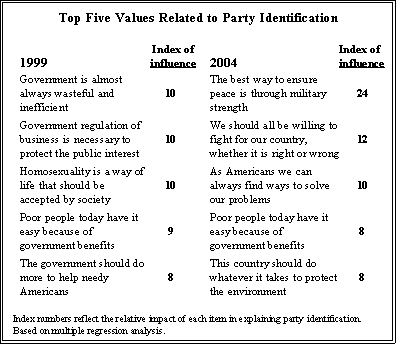 Of course, differences over America’s place in the world are not new. Indeed, it would be hard to argue that the political tensions over national security are any greater now than they were during the Vietnam or Korean Wars. Even in the 1990s, when national security largely receded as a public concern, there were substantial disagreements over the efficacy of military force and over Americans’ obligation to fight for their country.
Of course, differences over America’s place in the world are not new. Indeed, it would be hard to argue that the political tensions over national security are any greater now than they were during the Vietnam or Korean Wars. Even in the 1990s, when national security largely receded as a public concern, there were substantial disagreements over the efficacy of military force and over Americans’ obligation to fight for their country.
What has changed since then is the extent to which attitudes toward national security influence partisan affiliation and voting decisions. During the 1990s, attitudes about government, welfare and business — as well as opinions concerning homosexuality — were most important in determining party affiliation, voting decisions, and presidential approval. But today, a single question — regarding the relative effectiveness of force versus diplomacy — is as powerful a predictor of party identification as the full set of values questions were in 1999.
Democratic Shift on Security
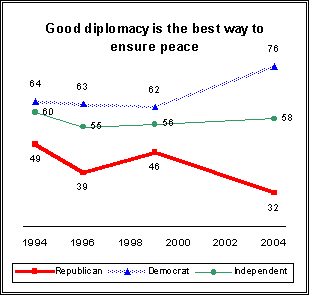 Significantly, the values study found little change in the public’s overall views on basic foreign policy attitudes, even as Republicans and Democrats have grown further apart. A modest majority of all Americans (55%) said in December 2004 that good diplomacy, not military strength, is the best way to ensure peace. That was the same number who held that view in 1999 and virtually the same as in 1996 (53%).
Significantly, the values study found little change in the public’s overall views on basic foreign policy attitudes, even as Republicans and Democrats have grown further apart. A modest majority of all Americans (55%) said in December 2004 that good diplomacy, not military strength, is the best way to ensure peace. That was the same number who held that view in 1999 and virtually the same as in 1996 (53%).
However, an increasing number of Republicans subscribe to the view that military strength — rather than effective diplomacy — is the best way to ensure peace. The percentage endorsing diplomacy as the better option dropped from 46% in 1999 to 32% in 2004.
The movement among Democrats — in the opposite direction — has been just as dramatic. In the 1990s, roughly 60% of Democrats expressed the view that good diplomacy was the best way to ensure peace; that number rose to 76% in 2004.
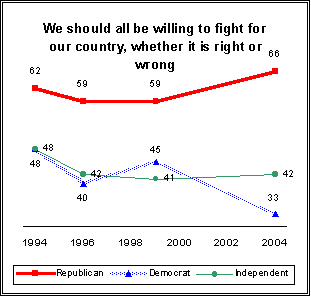 A similar pattern is evident in views on the obligation to fight for the country, whether it is right or wrong.
A similar pattern is evident in views on the obligation to fight for the country, whether it is right or wrong.
As in the 1990s, the public remained split on this measure — 46% thought a person should fight, whether the country is right or wrong, while an identical number said it is acceptable for someone to decline to fight in a war they see as morally wrong.
Since 1999, an increasing number of Republicans express the view that a person has an obligation to fight, while Democrats have moved in the opposite direction. By 66% to 27%, Republicans said that people should fight for the country, right or wrong; Democrats, by a comparable margin said it is acceptable to refuse to fight in a war that one sees as morally wrong.
 Election Intensifies Differences
Election Intensifies Differences
Pew first found evidence of a growing political gap in national security values more than a year ago, in our major survey on the Americans political landscape in November 2003. If anything, the 2004 election appears to have intensified these differences.
Roughly two-thirds of Bush voters said that using overwhelming force is the best way to defeat global terrorism. An even larger percentage of Kerry voters said that relying too much on military force creates hatred that leads to more terrorism.
Bush and Kerry voters also expressed starkly different views about the U.S. role in world affairs. While a majority of Bush voters endorsed an activist foreign policy, just as many Kerry voters instead agreed with the statement: “We should pay less attention to problems overseas and concentrate on problems here at home.”
 Consensus Amid Conflict
Consensus Amid Conflict
However, what is frequently overlooked in discussions of public values is the extent to which there is a large measure of agreement, at least on general principles.
For example, roughly three-quarters of Americans said that “religion is a very important part of my life.” And slightly more — 78% — believe that everyone has it in his or her own power to succeed. These are values that transcend politics and set Americans apart from people in other wealthy nations.
There also are more concrete issues on which much of the public holds similar values. By more than four-to-one, Americans said the country “should do whatever it takes” to protect the environment. And by a similar margin — 77%-16% — the public felt that the largest companies have too much power. Even on the contentious subject of race, significant majorities of Americans said that the position of blacks has improved in recent years.
Where Consensus Splinters
As is frequently the case, there was greater consensus on fundamental values relating to religion, business and other subjects than on more practical questions of policy implementation. Despite the overwhelming sense that big business is too powerful, for example, there was no agreement over the wisdom of using government to counteract that power.
 The public also was divided over whether businesses make too much profit — 53% thought they do, while 39% said that corporate profits are reasonable. This opinion has remained stable over the past decade, despite the corporate scandals of recent years. Republicans and Democrats have very different views on this question, with a 64% majority of Democrats saying profits are too high compared with only 46% of Republicans who felt this way.
The public also was divided over whether businesses make too much profit — 53% thought they do, while 39% said that corporate profits are reasonable. This opinion has remained stable over the past decade, despite the corporate scandals of recent years. Republicans and Democrats have very different views on this question, with a 64% majority of Democrats saying profits are too high compared with only 46% of Republicans who felt this way.
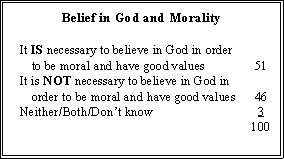 Religion and Morality
Religion and Morality
Although Americans are bound by their sense of the personal importance of religion, they divide almost evenly over whether belief in God is a prerequisite of personal morality. Roughly half assert that it is necessary to believe in God to be a moral person, while nearly as many disagree.
This is not a partisan question; Democrats and Republicans are each split on the issue. But the link between faith and morality divides the public in other ways. Only about a third of college graduates (35%) believe a person needs to believe in God in order to be moral, while more than two-thirds (68%) of those with no high school diploma feel this way. Whites are split evenly on the question, but blacks by a three-to-one margin (72% to 24%) see faith in God as necessary for a moral life.
Personal Empowerment
Americans not only overwhelmingly believe that all people have it in their power to succeed, they also see hard work as the key to success. About two-thirds agreed with the statement that “most people who want to get ahead can make it if they’re willing to work hard.” That is down a bit from the boom years of 1999 and 2000, but majorities of Americans at all income levels still think hard work can lead to success.
The public is somewhat less bullish about the country’s ability to deal with problems, a judgment that is made to some degree through a partisan lens. Overall, 59% thought that Americans “can always find ways to solve our problems and get what we want”; 36% said the country cannot solve many of its problems. Nearly three-quarters of Republicans said Americans generally are capable of dealing with their problems — but only about half of Democrats agreed.
As in the past, opinion is split fairly evenly over whether there are any limits to growth in this country. A narrow 51% majority said there are no limits to growth, but as many as 41% thought that Americans “should learn to live with less.”
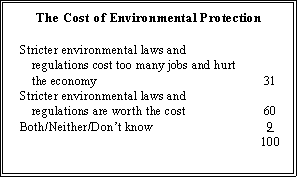 Protecting the Environment
Protecting the Environment
Large and unchanging majorities of the public endorse environmentalism. However, for many the potential economic costs associated with stricter environmental laws are more problematic.
Ideology and partisanship strongly influence views on this measure. By more than six-to-one (83% to 12%), liberal Democrats said that tougher environmental laws are worth the cost. Just 49% of conservative Republicans agreed, while 41% thought such laws cost too many jobs and hurt the economy.
 How Much Black Progress?
How Much Black Progress?
Americans continue to take a positive view of the amount of progress achieved by African Americans. By more than three-to-one (73%-20%), the public said that the position of blacks in Americans society has improved in recent years.
There was a sizable split between whites and African Americans on this question, though even among blacks a majority (56%) said progress has been made. Attitudes on this value have been stable for a decade, among whites and blacks.
Most Americans endorsed the view that blacks who have been unable to make gains are mostly responsible for their own circumstances. But this is much more of a settled issue for whites than for African Americans, who are evenly divided over whether blacks who cannot get ahead are responsible for their fate, or whether racial discrimination is to blame.
 Little Change in Views on Homosexuality
Little Change in Views on Homosexuality
An earlier Pew survey on the nation’s political landscape, conducted in November 2003, showed that despite the signs of increasing polarization on many issues, there was no evidence of a growing gap on social and cultural values. In spite of the debate over the role that moral values and issues such as gay marriage played in Bush’s victory, that remained pretty much the case in Pew’s post-election values survey.
For example, on the question on whether homosexuality should be accepted or discouraged, which Pew has been measuring for a decade, 49% said it should be accepted, while 44% thought homosexuality should be discouraged. That was consistent with results from surveys in 2000 and 1999; in the mid-1990s, the balance was tilted slightly the other way, with pluralities saying homosexuality should be discouraged.
There are major differences between Republicans and Democrats on this value — 58% of Democrats and 36% of Republicans said that homosexuality should be accepted and not discouraged. But in contrast with attitudes toward national security, where there has been a growing partisan gap, the balance of opinion among Republicans and Democrats on this question has changed very little since the 1990s.
 On the broad question of the government’s role in upholding morals, about half of all Americans — 51% — agreed with the statement “I worry the government is getting too involved in the issue of morality,” while 41% favored the government doing more in this area.
On the broad question of the government’s role in upholding morals, about half of all Americans — 51% — agreed with the statement “I worry the government is getting too involved in the issue of morality,” while 41% favored the government doing more in this area.
Republicans were more supportive than Democrats of greater government involvement in protecting morals. Still, Republicans were somewhat ambivalent — 53% believed the government should do more to protect morality while 41% said they worry that the government is getting too involved in morality.
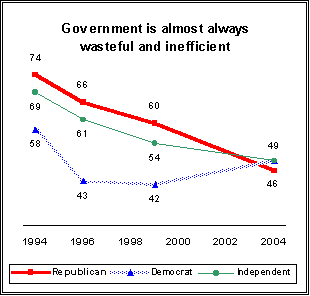 Government OK with GOP
Government OK with GOP
Americans have long been conflicted in their overall views of government and politicians. At times, the public has swung toward a harshly critical stance — as in the mid-1990s, when anti-government sentiment surged. But in the wake of September 11, support for government rebounded, as Americans looked to Washington for protection.
Pew’s December 2004 survey on political values found moderation in the public’s attitudes toward government. Nearly half of all Americans — 45% — thought government does a better job than it gets credit for; about the same number (47%) said that government is almost always “wasteful and inefficient.” There was a similar split over the efficacy of government regulation — 49% believed it is necessary to protect the public interest, while 41% said it does more harm than good.
But Democrats and Republicans no longer differ on these questions as they did through the 1990s. As recently as 1999, there were gaps of about 20 percentage points between the parties on both of these values; and throughout the 1990s, responses to these questions were important predictors of voting preference.
Those differences have now narrowed or vanished, and the change has been largely driven by growing pro-government sentiment among Republicans. This no doubt has much to do with the fact Republicans now control both the White House and Congress. Even so, the GOP’s increasing comfort with government represents a major shift from the days of the Republican revolution.
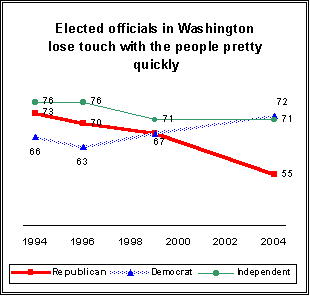 Politicians have long had a negative image with the public. Two-thirds of Americans (66%) said in the December 2004 survey that elected officials in Washington lose touch with people pretty quickly, and 63% felt that elected officials generally “don’t care what people like me think.” These numbers actually represent modest improvement since the mid-1990s.
Politicians have long had a negative image with the public. Two-thirds of Americans (66%) said in the December 2004 survey that elected officials in Washington lose touch with people pretty quickly, and 63% felt that elected officials generally “don’t care what people like me think.” These numbers actually represent modest improvement since the mid-1990s.
Reflecting their parties’ contrasting political fortunes over the past decade, Republicans have become much less critical of Washington politicians, while Democrats have become somewhat more negative. In July 1994, 73% of Republicans said that elected officials tend to lose touch quickly; ten years later, 55% felt this way. By comparison, the number of Democrats taking this position grew from 66% in July 1994 to 72% last year.
 Debating Immigration’s Impact
Debating Immigration’s Impact
The values survey showed the public is evenly divided on the impact that immigrants are having on American culture and the economy. It also found no evidence that concerns about terrorism and homeland security have led to significantly more negative views of immigrants.
About as many people said immigrants strengthen the U.S., because of their hard work and talents, as said they are a burden because of the impact on jobs, schools, health care and the like. Views of immigrants were a bit less positive than in 2000, during the economic boom, but much more favorable than in the mid-1990s. In 1994, the public by two to one saw immigrants as burdening the U.S. rather than strengthening it.
 Americans also disagreed about whether immigrants, on balance, strengthen American culture (50% said this) or threaten it (40%). Hispanics were far more positive about immigrants than are whites or African-Americans.
Americans also disagreed about whether immigrants, on balance, strengthen American culture (50% said this) or threaten it (40%). Hispanics were far more positive about immigrants than are whites or African-Americans.
Split Over Social Safety Net
Over the past decade, there has been a significant rise in empathy for the poor, as well as growing support for more government assistance for the poor and needy. About half of Americans subscribe to the view that poor people have hard lives because government benefits do not go far enough; only about a third think that the poor have it easy because they receive government benefits. That represents a major shift since the mid-1990s, when narrow majorities felt poor people had easy lives.
 In the wake of welfare reform and tighter economic times, the public also has grown more supportive of increased assistance to poor and needy people. Over the past decade or so, the number favoring more aid for needy people has increased from about 50% to 57%.
In the wake of welfare reform and tighter economic times, the public also has grown more supportive of increased assistance to poor and needy people. Over the past decade or so, the number favoring more aid for needy people has increased from about 50% to 57%.
Attitudes toward the social safety net remain very partisan, but there have been major shifts on these measures among members of both parties over the past decade. In July 1994, nearly two-thirds of Republicans said that poor people have easy lives; late last year, half of Republicans expressed that view. Over the same period, the number of Democrats who believe that the poor have it easy has dropped from 44% to 24%.
A decade ago, 61% of Republicans felt that the government could not afford to do more to help the poor. In the 2004 values survey, as many Republicans said the government should do more to help the poor, even if it means going deeper into debt, as felt that the government cannot afford greater aid to the poor. The number of Democrats favoring increased aid to the poor also rose — from 59% to 68%.
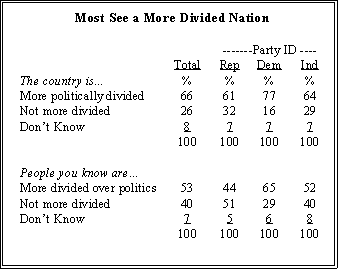 Perception Meets Reality
Perception Meets Reality
The nation’s contentious political atmosphere is not lost on the public. In fact, it is a rare point on which majorities of both parties agree. In December 2004, Pew found 77% of Democrats and 61% of Republicans saying the country is more politically divided than in the past.
Moreover, people perceive this increasing partisan tension not only in the context of national politics and policies, but also in how they relate to friends and acquaintances.
More than half of all Americans (53%) said the people they know are disagreeing more about politics these days.
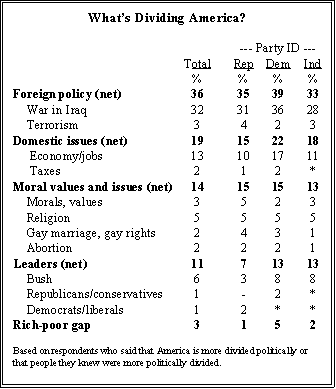 Within their own circles, Democrats are much more apt than Republicans to perceive political divisiveness; 65% of Democrats said this, compared with only 44% of Republicans.
Within their own circles, Democrats are much more apt than Republicans to perceive political divisiveness; 65% of Democrats said this, compared with only 44% of Republicans.
Why do Americans think the country is more divided today? Not surprisingly, the war in Iraq is seen as the most important reason. Roughly a third (32%) of those who believe the nation is more divided than in the past point to the war as the primary factor; far fewer cite economic issues, or moral values and such social concerns as gay marriage.
Close to Parity in Party Identification
Based on Pew polls conducted throughout 2004, the Democratic Party held a slight edge in party affiliation among the general public (33%-30%).
More significant, of course, was the fact that Republicans turned out at a higher rate on Election Day and therefore matched Democratic turnout (37% each), according to the exit poll conducted by the National Election Pool.
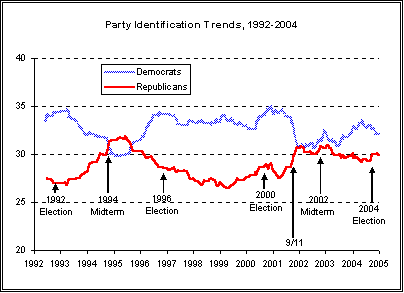 That marked the first presidential election since modern exit polling began a generation ago that Republicans had equaled the Democrats in turnout.
That marked the first presidential election since modern exit polling began a generation ago that Republicans had equaled the Democrats in turnout.
From the time that Bush first took office in 2001, party affiliation among the public has undergone significant changes. Early in Bush’s first term, the Democrats held roughly the same advantage in party identification as they enjoyed during Bill Clinton’s second term in office. Democrats had held a much more substantial advantage in partisan identification for most of the 20th century.
Republicans made gains in party affiliation following the Sept. 11 attacks, bringing the parties into virtual parity, but slipped back slightly in 2004.
The Democrats have maintained a slight lead for most of the past year — though, as noted above, that partisan edge among the general public did not translate into a Democratic advantage among those who actually voted last November.
 Where the Parties Stand
Where the Parties Stand
The Democratic Party continues to hold a solid advantage among African-Americans, Jews, Hispanics, liberals, women, people who did not finish high school, lower-income individuals, and seculars.
Republicans have a big edge among conservatives and White Evangelical Protestants, and hold smaller but significant advantages among middle- and upper-income citizens and whites. The parties are about equally represented among people with college experience, White Catholics, and men.
There has been relatively little change in party identification among most of these groups in the population. Republican identification among White Evangelical Protestants has grown over the past four years, but black support for the Democratic Party has not wavered. President Bush posted gains among Hispanic voters in the election of 2004, but Democrats still outnumber Republicans by two-to-one in this growing segment of the population.


